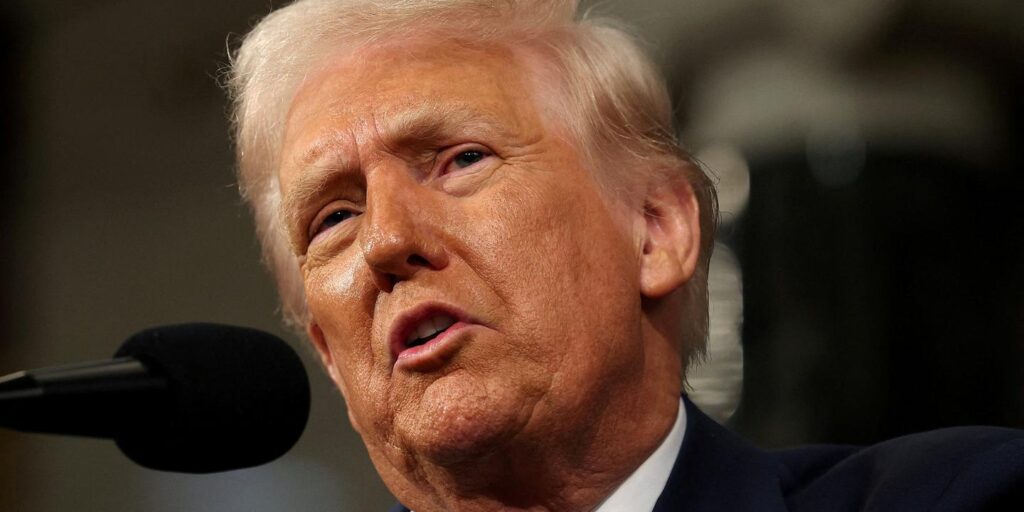The United States Federal Reserve will continue to wait and see how the economy evolves before deciding whether to reduce its key interest rate, Chair Jerome Powell has said, a stance directly at odds with President Donald Trump’s calls for immediate cuts.
“For the time being, we are well positioned to wait to learn more about the likely course of the economy before considering any adjustments to our policy stance,” Powell said in prepared remarks on Tuesday before the Republican-led US House Committee on Financial Services.
Powell has told members of Congress that the Fed or US central bank isn’t meant to endorse or criticise Trump’s tariff plans, only to deal with the expected impact on inflation.
“We (the Federal Reserve) aren’t commenting on tariffs,” Powell said. “Our job is keeping inflation under control, and when policies have short- and medium-term, meaningful implications, then inflation becomes our job.”
In response to suggestions from GOP members that rates should fall, as Trump has repeatedly demanded, Powell said the outlook for higher inflation over the year is widely shared among economists.
“All professional forecasters I know of … expect a meaningful increase in inflation over the course of this year,” Powell said, elaborating on the Fed’s reluctance to cut rates while major aspects of Trump’s trade policy remain unresolved.
Looming changes
Powell said the central bank needs more time to see if rising tariffs drive inflation higher before considering lowering rates. He also expects the Fed to get a lot of information about the inflation effects of tariffs in the next couple of months, anticipating that he will see more tariff impacts on the data starting with readings from June.
“Increases in tariffs this year are likely to push up prices and weigh on economic activity,” Powell said in testimony at the start of the hearing.
“The effects on inflation could be short-lived, reflecting a one-time shift in the price level. It is also possible that the inflationary effects could instead be more persistent … For the time being, we are well positioned to wait to learn more about the likely course of the economy before considering any adjustments to our policy stance.”
Following the release of Powell’s testimony, investors pared bets that the central bank might cut its policy interest rate as soon as its July meeting, and increased the perceived odds for a rate reduction in September, with another to follow later in the year.
Powell’s testimony, as is usually the case with his semiannual congressional appearances, largely tracks the central bank’s most recent policy statement, approved last week. Fed officials voted unanimously at that meeting to hold the benchmark interest rate steady in the current 4.25 percent to 4.5 percent range, and gave no indication that rate cuts were imminent.
New economic projections released at the time showed officials at the median expect two quarter-point rate cuts by the end of the year, in line with current market pricing.
In recent days, two Fed governors, both Trump appointees, have said rates could fall as soon as the July meeting, given inflation has not yet risen in response to tariffs, while two reserve bank presidents say they still worry inflation will intensify over the rest of the year.
Trump, who appointed Powell as chair in his first term but is expected to replace him when Powell’s term ends next spring, has repeatedly called for steep rate cuts.
“We should be at least two to three points lower,” he said in a social media post ahead of the hearing, adding in reference to Powell that he hoped “Congress really works this very dumb, hardheaded person, over.”
Powell has built strong alliances in Congress over his three terms as Fed chair, often getting plaudits from Republicans and Democrats for his oversight of the Fed.
In his prepared testimony, Powell said the economy remains in a “solid position”, with low unemployment and inflation far below its pandemic-era peak.
But much about Trump’s trade policies remains in flux, with a July 9 deadline approaching for higher tariffs on a large set of countries.
The outcome of that policy shift will be critical for the Fed to understand, Powell said.
“Policy changes continue to evolve, and their effects on the economy remain uncertain,” Powell said.
Powell’s comments on inflation come as consumer confidence begins to dip again. Today, the Conference Board released its monthly report, which showed the erasure of half of the gains in consumer confidence since May.
“Inflation and high prices were another important concern cited by consumers in June,” the report said. “However, there were a few more mentions of easing inflation compared to last month.”


